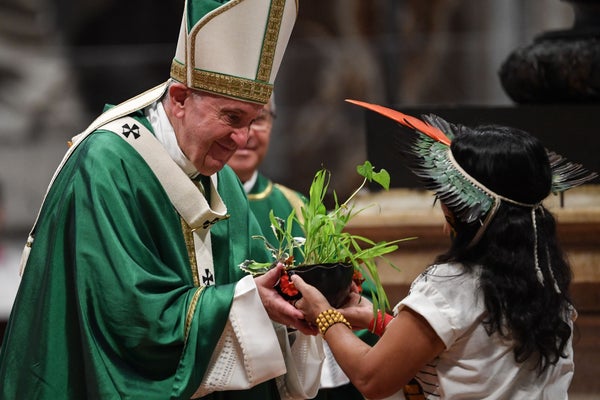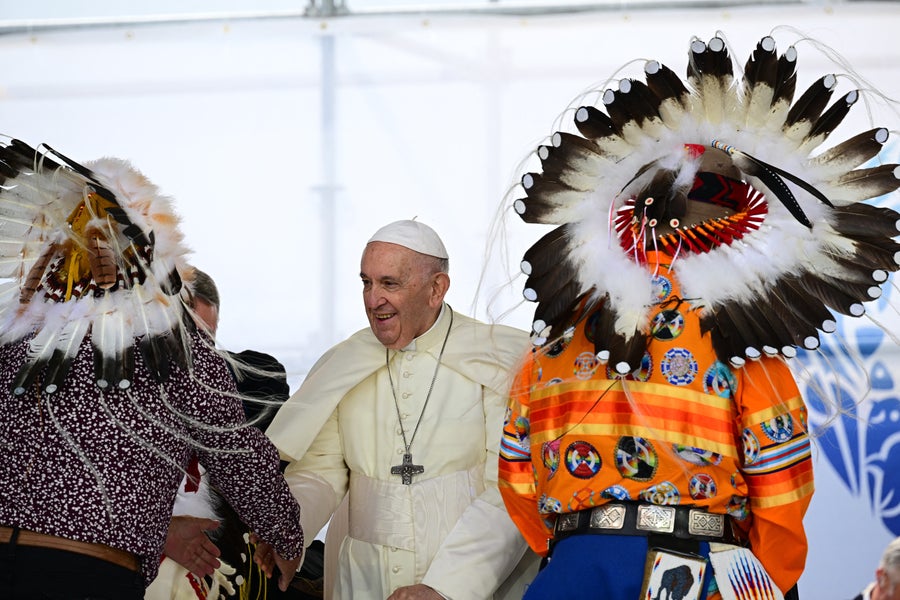Three Ways Pope Francis Influenced Global Climate Action
The late Pope Francis supported global climate agreements, advocated for Indigenous people and inspired activism

Pope Francis receives a plant offered by an Amazon native as he celebrates the closing mass of the Synod on Amazonia on October 27, 2019 at the Saint Peter’s Basilica in the Vatican.
Andreas Solaro/AFP via Getty Images
The following essay is reprinted with permission from ![]() The Conversation, an online publication covering the latest research.
The Conversation, an online publication covering the latest research.
The death of Pope Francis has been announced by the Vatican. I first met the late Pope Francis at the Vatican after a conference called Saving Our Common Home and the Future of Life on Earth in July 2018. My colleagues and I sensed something momentous was happening at the heart of the church.
At that time, I was helping to set up the new Laudato Si’ research institute at the Jesuit Hall at the University of Oxford. This institute is named after the pope’s 2015 encyclical (a letter to bishops outlining church policy) on climate change.
On supporting science journalism
If you’re enjoying this article, consider supporting our award-winning journalism by subscribing. By purchasing a subscription you are helping to ensure the future of impactful stories about the discoveries and ideas shaping our world today.
Its mission is rooted in the pope’s religiously inspired vision of integral ecology– a multidisciplinary approach that addresses social and ecological issues of equality and climate breakdown.
Originating from Argentina, Pope Francis, the first Jesuit pope, witnessed firsthand the destruction of the Amazon and the plight of South America’s poorest communities. His concern for justice for vulnerable communities and protection of the planet go hand in hand with his religious leadership.
In his first papal letter, Laudato Si’, he called for all people, not just Catholics, to pay more attention to the frailty of both our planet and its people. What we need is no less than a cultural revolution, he wrote. As a theologian, I recognise that he inspired significant change in three key ways.
1. At global climate summits
It’s no coincidence that Pope Francis released Laudato Si’ at a crucial moment in 2015 prior to the UN climate summit, Cop21, in Paris. A follow-up exhortation, or official statement, Laudate Deum, was released in October 2023, just before another UN climate summit, Cop28 in Dubai.
Did the decisions at these global meetings shift because of the influence of Pope Francis? Potentially, yes. In Laudate Deum, Pope Francis showed both encouragement and some frustration about the achievements of international agreements so far.
He berated the weakness of international politics and believes that Cop21 represented a “significant moment” because the agreement involved everyone.
After Cop21, he pointed out how most nations had failed to implement the Paris agreement which called for limiting the global temperature rise in this century to below 2°C. He also called out the lack of monitoring of those commitments and subsequent political inertia. He tried his best to use his prominent position to hold power to account.
Promoting a general moral awareness of the need to act in ecologically responsible ways, both in international politics and at the local level is something that previous popes, Pope John Paul II and Pope Benedict XVI also did. But, Pope Francis’s efforts went beyond that, by connecting much more broadly with grassroots movements.
2. By advocating for Indigenous people
Cop28 marked the first time that close to 200 countries agreed to transition away from fossil fuels. Pope Francis’s interventions potentially helped shift the needle just a little in the desired direction.
His emphasis on listening to Indigenous people may have influenced these gatherings. Compared with previous global climate summits, Cop28 arguably opened up the opportunity to listen to the voices of Indigenous people.
However, Indigenous people were still disappointed by the outcomes of Cop28. Pope Francis’s lesser-known exhortation Querida Amazonia, which means “beloved Amazonia,” was published in February 2020.

Pope Francis meets with the indigenous community at Muskwa Park in Maskwacis, south of Edmonton, western Canada, on July 25, 2022.
Vincenzo Pinto/AFP via Getty Images
This exhortation resulted from his conversations with Amazonian communities and helped put Indigenous perspectives on the map. Those perspectives helped shape Catholic social teaching in the encyclical Fratelli Tutti, which means “all brothers and sisters,” published on October 3 2020.
For many people living in developing countries where extractive industries such as oil and gas or mining are rife, destruction of land coincides with direct threats to life. Pope Francis advocated for Indigenous environmental defenders, many of whom have been inspired to act by their strong faith.
For example, Father Marcelo Pérez, an Indigenous priest living in Mexico, was murdered by drug dealers just after saying mass on October 23 2023 as part of the cost of defending the rights of his people and their land.
While 196 environmental defenders were killed globally in 2023, Pope Francis continued to advocate on behalf of the most marginalised people as well as the environment.
3. By inspiring activism
I’ve been speaking to religious climate activists from different church backgrounds in the UK as part of a multidisciplinary research project on religion, theology and climate change based at the University of Manchester. Most notably, when we asked more than 300 activists representing six different activist groups who most influenced them to get involved in climate action, 61% named Pope Francis as a key influencer.
On a larger scale, Laudato Si’ gave rise to the Laudato Si’ movement which coordinates climate activism across the globe. It has 900 Catholic organisations as well as 10,000 of what are known as Laudato Si’ “animators”, who are all ambassadors and leaders in their respective communities.
Our institute’s ecclesial affiliate, Tomás Insua, based in Assisi, Italy, originally helped pioneer this global Laudato Si’ movement. We host a number of ecumenical gatherings which bring together people from different denominations and hopefully motivate churchgoers to think and act in a more climate-conscious way.
Nobody knows who the next pope might be. Given the current turmoil in politics and shutting down of political will to address the climate emergency, we can only hope they will build on the legacy of Pope Francis and influence political change for the good, from the grassroots frontline right up to the highest global ambitions.
This article was originally published on The Conversation. Read the original article.




